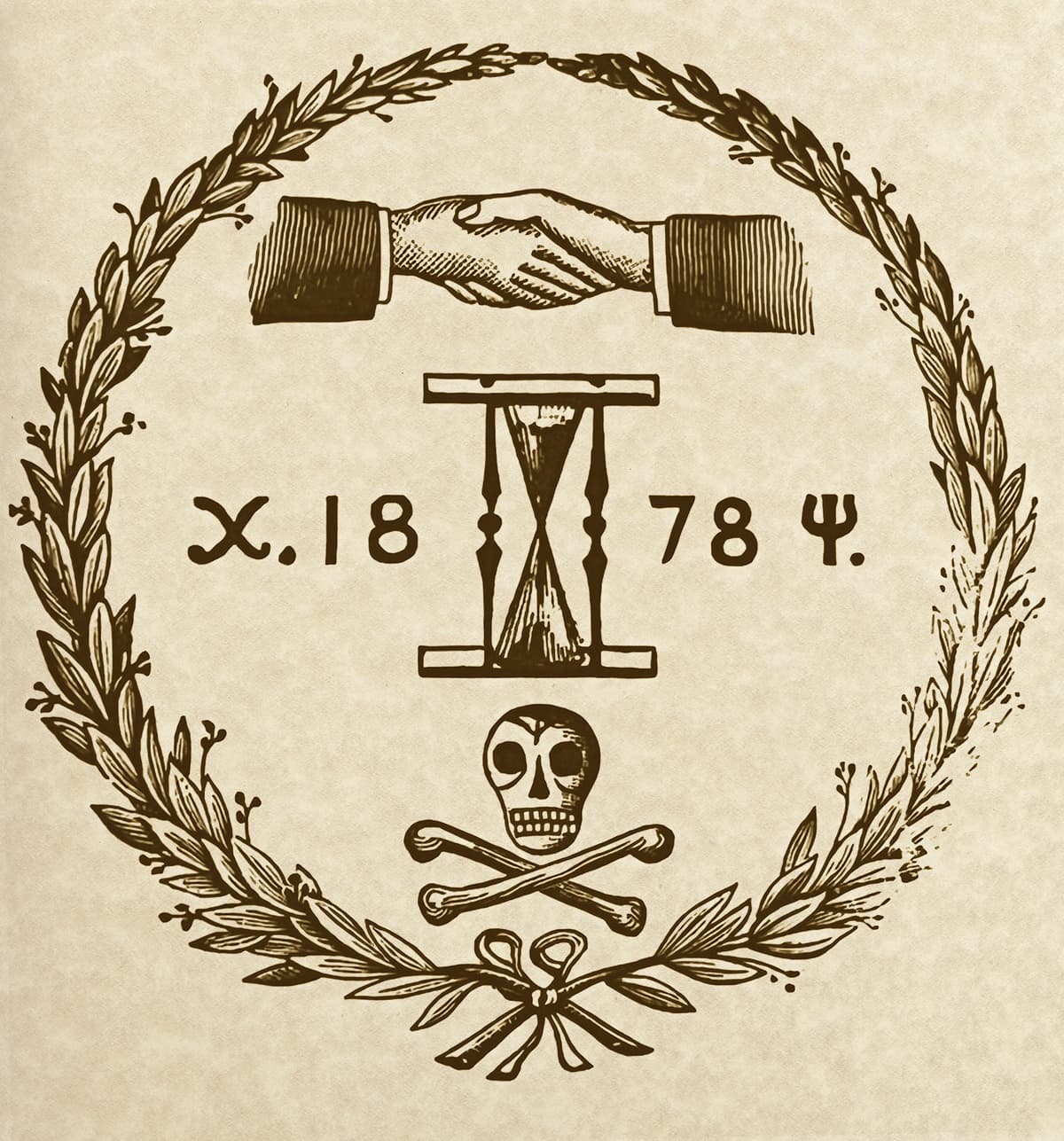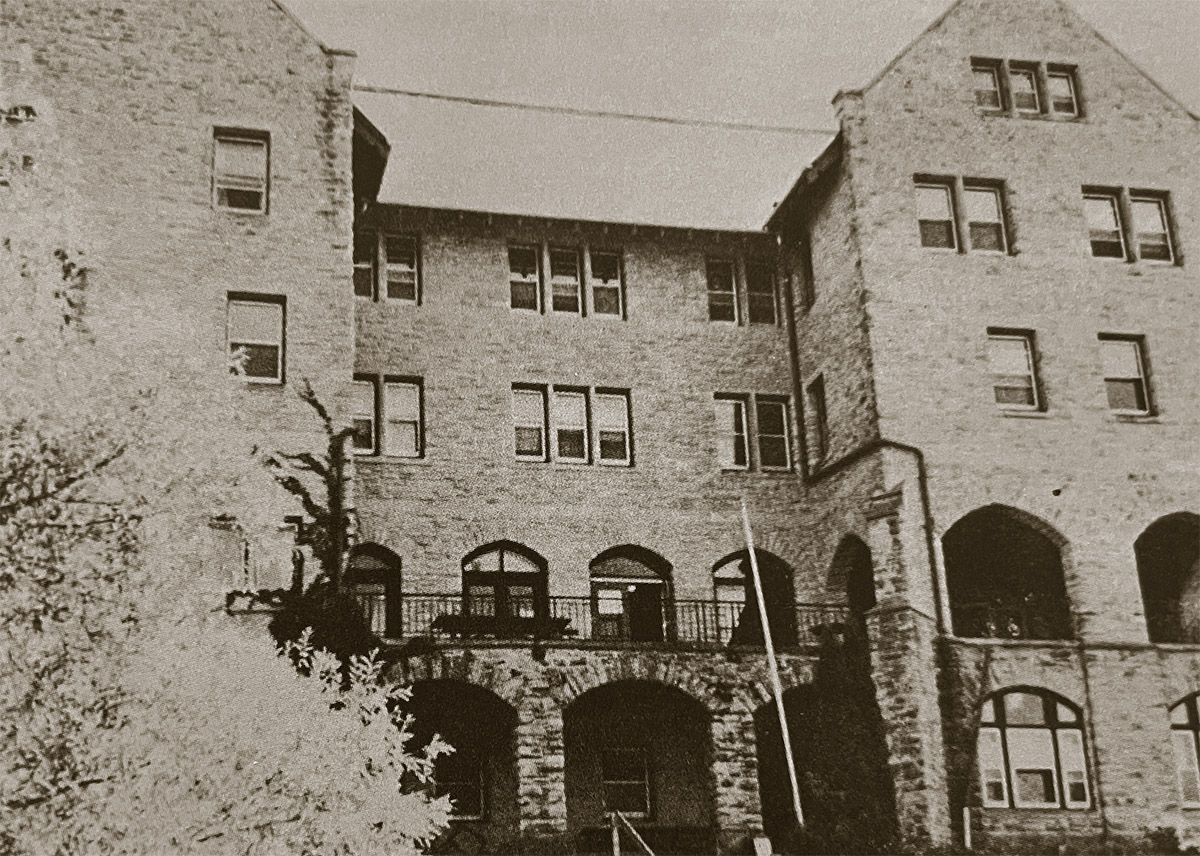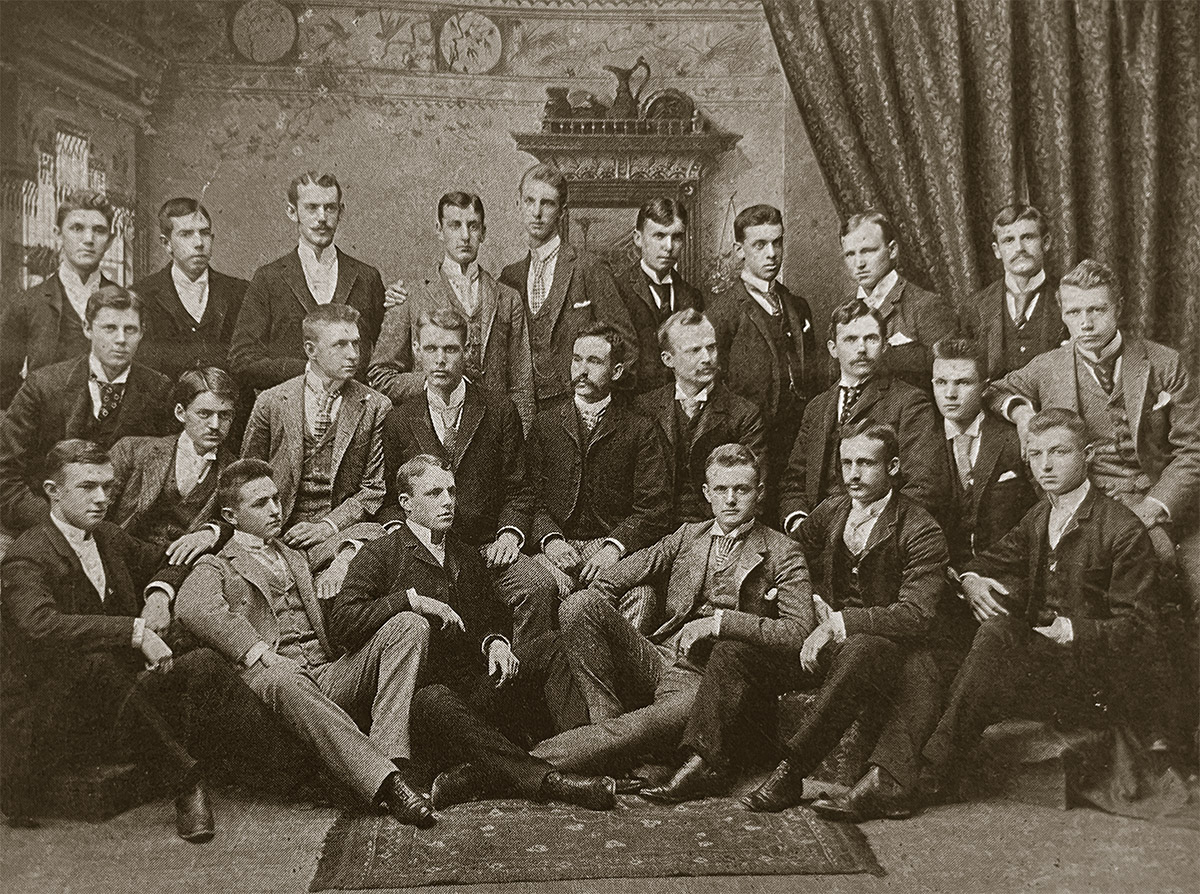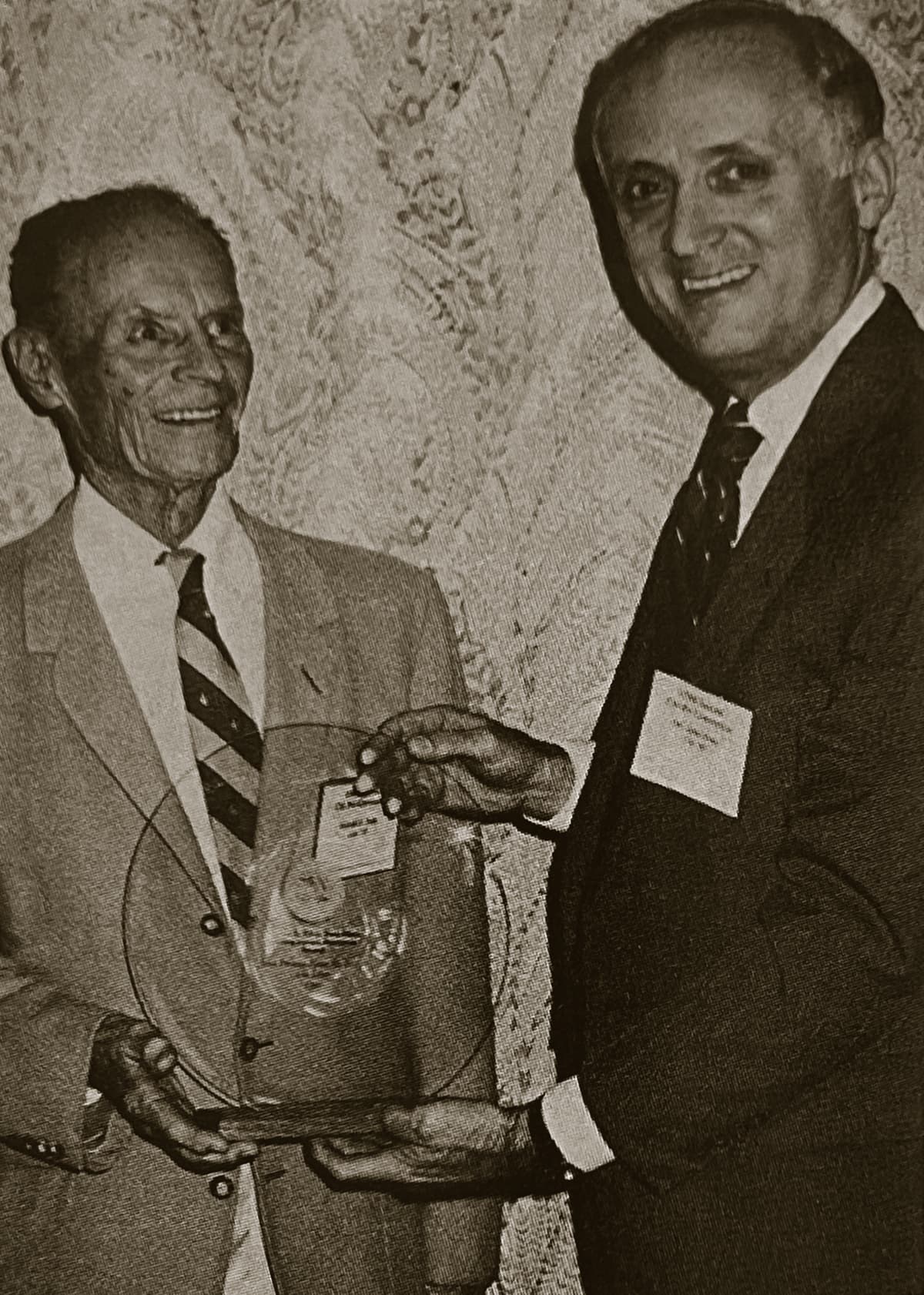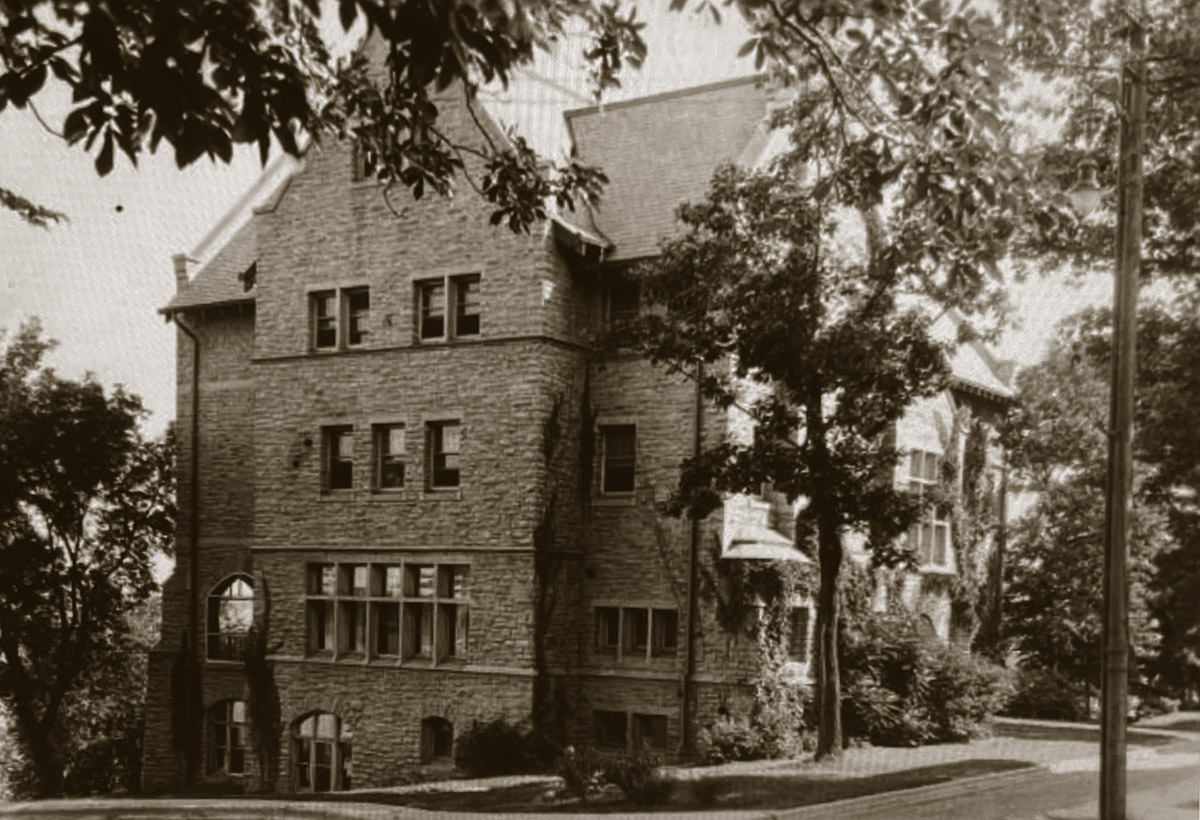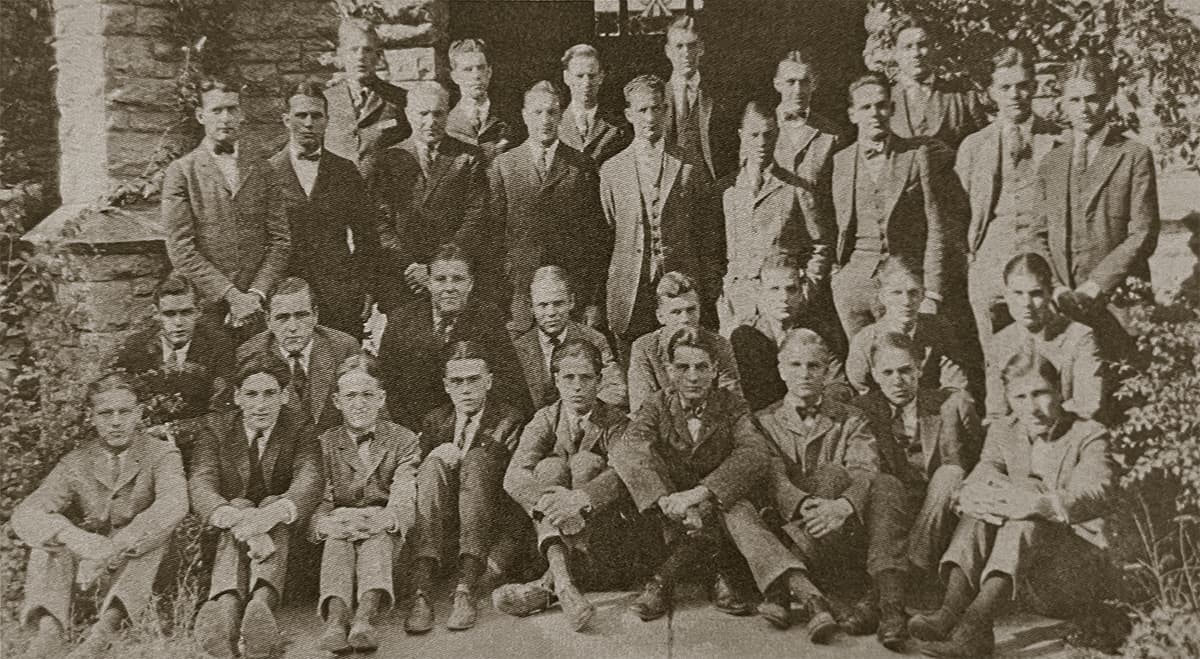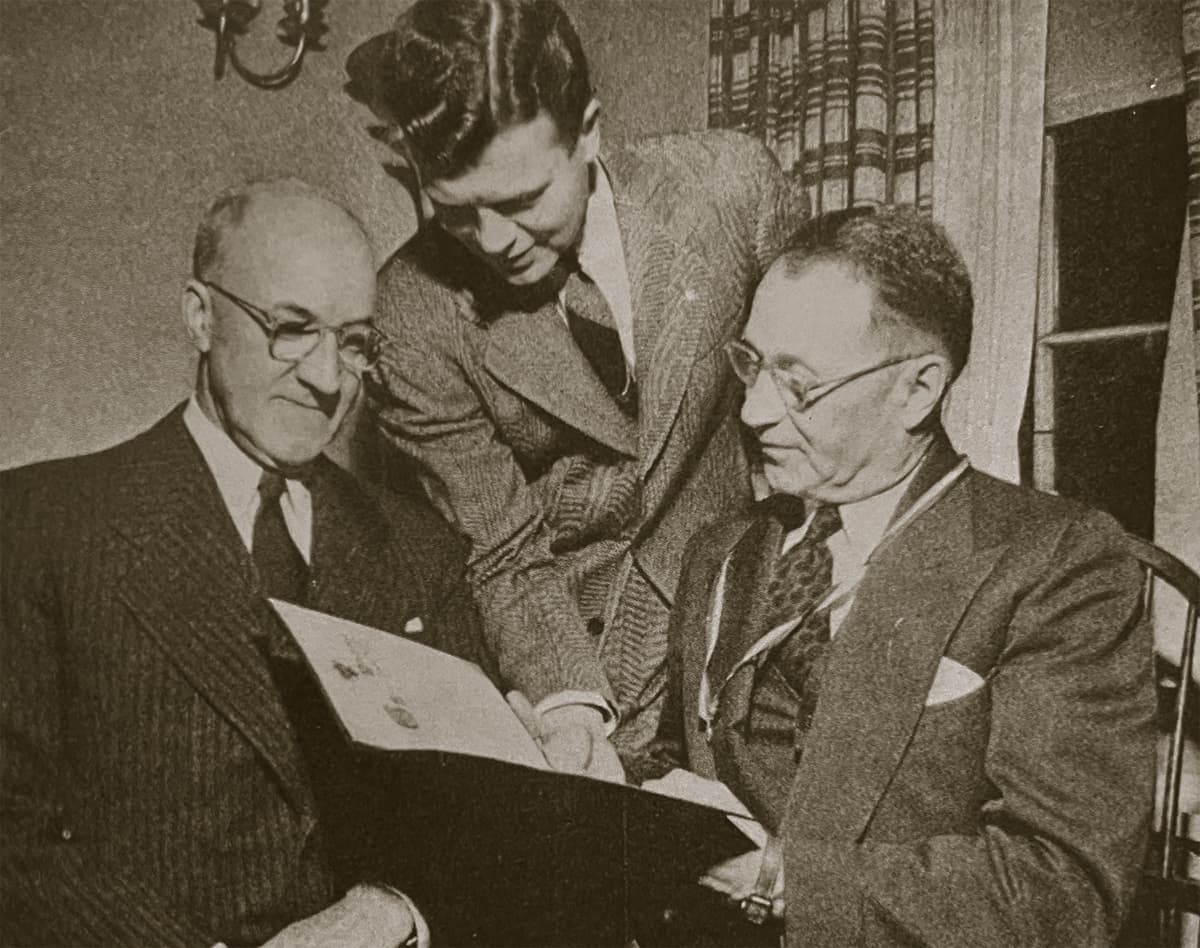History of Alpha Iota
From the 1991 Sesquicentennial Catalogue (source)
ALPHA IOTA was established on 8 November 1878, at the University of Wisconsin, Madison, Wisconsin, by William Gilbert Anderson, George Mooar Bascom, Frederick William Fratt, Frederick Nellington Hendrix, Charles Francis Lamb, Edward Joy Paul, and Edward Alonzo Small. Gamma, Henry Jules Myer, E ’79; and Zeta, Max Zinkeisen, E ’80.
In the year before the founding of Alpha Iota, some of the alumni of one of the older fraternities then regarded as being distinctly eastern in its type had approached Edward Joy Paul, who was then in his junior year at the University of Wisconsin, with a proposal that he, together with others whom he might choose as associates, make application to their fraternity for a charter for a chapter at Madison. Under their guidance, and with the strong backing of prominent members in official and social life, this chosen group made an application duly referred to a committee appointed to investigate the local situation. That committee visited Madison, and although their report was favorable, the governing body regarded Wisconsin as being too far west for one of their chapters. Thus ended the first phase of the story leading to Chi Psi in Wisconsin.
In the year 1878, only three fraternities were established at the university: Phi Delta Theta (1857), Beta Theta Pi (1873), and Phi Kappa Psi (1875) which were all prospering and in good standing. There was so plainly room for a fourth that Paul and his associates of the previous year did not disband. Some had left the college, but others took their places, with Paul continuing to be the outstanding leader. Because of a friendship from high school days in Milwaukee with Max Zinkeisen, who was then an undergraduate at the University of Michigan and a member of Alpha Epsilon, and, as a result, of some conversations between these friends, an application was made to Chi Psi for a charter. The convention, at its meeting in May 1878, “gave favorable consideration” to the application, and the duty of installing a new Alpha was delegated to Alpha Epsilon. The name of Brother Zinkeisen as one of the initiating officers appears after the list of charter members. During his life, he maintained an active interest in the Fraternity, particularly in this Alpha. Paul and Hendrix were initiated at the Lodge of Alpha Epsilon on 4 November 1878, and upon their return to Madison, they conducted the initiation of the other charter members. Be it remembered, then, that the first initiation and first regular meeting of Alpha Iota were held in Brother Paul’s room on the southwest corner of the second floor of what is now South Hall, but then known as the South Dormitory.
As the Alpha grew, there was a need for more room than was afforded in the dormitory rooms, where chance visitors were always likely to interrupt proceedings. Again it was Alpha Epsilon through one of its alumni that lent a helping hand. Edward Chauncey Hinman, E ’74, was then an assistant United States engineer on the improvement work on the Wisconsin and Fox Rivers. The south end of his district was at Portage, only forty miles away, and he quickly made the trip to Madison to see how the young Alpha was prospering. He realized the necessity of having a Lodge hall. He assisted and contributed to the project. Chicago alumni were visited and willingly contributed to a fund for furnishing the new Lodge room. Among the donors most pleasantly remembered for his interest and generous assistance was Melville W. Fuller, H ’53, who later became the Chief Justice of the United States Supreme Court. This first Lodge Hall was on the third floor of the Sherlock Block; since demolished, the site was on the flat-iron corner bounded by King, Butler, and Doty Streets. There was added a feeling of establishment, thus having their own place to meet.
Soon Iota’s growth presented a new problem. The Lodge room was too drafty to be kept warm in cold weather and was far from the university end of town. Several meetings were postponed because of the “icy blasts over Lake Mendota permeating the Lodge room.” The Alpha celebrated the anniversary of its founding by having its first alumni banquet at the Park Hotel in November 1880. The fellows were then considering better meeting quarters. After a comprehensive study of the whole situation, it was decided to rent a frame house that had been recently built on the northwesterly corner of Francis and Langdon Streets. The fellows who roomed at the Lodge used the furniture they had in their dormitory rooms.
The general living rooms absorbed most of the furnishings of the old Lodge rooms. This was the first of the fraternity houses at Madison and was regarded and commented upon by the rival societies as being too ostentatious and luxurious. This characterization vanished as others followed in the Chi Psi lead. Consider the luxury of that first Lodge in the light of present-day standards. Stoves did the heating for each room, and the Alpha was allotted coal bins in the basement. The Alpha paid for the heating of the general living room, and it was the responsibility of the officer most minor in grade to care for that fire.
On the ground floor was a double living room divided by folding doors. An alcove bedroom opened from one of these rooms, and that suite was commonly occupied by three or four fellows, who used the outer room as a study. These two rooms were opened on meeting nights, and the Alpha meeting filled both rooms. On the same floor was a kitchen with a pump to a cistern, then the only source of water supply. The second floor contained four bedrooms; the third floor was an attic used for trunk storage, and it was there that the first sections of the ceremonial sessions were held, the last part completed in the large living room. There was a formal opening of the Lodge at the November banquet of 1881, the dinner being served from one of the neighboring boarding houses. The old house still stands, but it has been so altered by adding a third and fourth floor that its first tenants would hardly recognize the old Lodge.
The new condition of our fraternity life brought about problems of its own. The Chi Psi Lodge became the meeting place for some activities in which fraternity men were especially interested. There was always some visiting going on and, as the house was of light construction, sound penetrated, and study at times almost impossible. In 1885 “house rules” were adopted, which made the Lodge a much more livable place. Meetings were held on Saturday evening, but sometimes fellow students, who knew not of Chi Psi ways, would call, and they had to be tactfully dismissed. There was another inconvenience on meeting nights in warm weather when every chair in the living room was filled, and the windows must remain closed. To meet the latter condition, a Lodge room downtown at times was hired for the evening. As a matter of general convenience, all the fraternities, by agreement, now hold their meetings on Monday evenings.
In the latter 1880s, when a city water supply had been established in Madison, and general living conditions had changed, the Alpha looked to the landlord to keep the Lodge and improvements up to date. There arose different opinions about who should pay for the furnace and upkeep. At the same time, the need for a larger house became imperative, for the membership was increasing. It was determined that the Brothers should have their meals in the Lodge instead of going to various boarding homes in the neighborhood. A lot on Lake Street fronting Lake Mendota was bought in 1889. There was a solid energetic group among the actives, and with alumni backing, they built a new Lodge into which the Alpha moved on 15 November 1892. This was a four-story frame house. It was the first house in Madison designed as a fraternity house, and in its day, it well met the requirements.
Much in the tradition of the earlier days and of this first Lodge that was our own that has been lost because, as tradition, it has never been recorded. Yet, some of it may be recovered from those who knew the ancient lore.
One memory of more recent years must not be allowed to fade. How many of the Brothers knew Maggie? Or how many, except for the last two or three delegations, did not receive Maggie’s welcome when they came to the Lodge? Perhaps some who knew her best never knew her by any name but “Maggie:” Her full name was Margaret Rodenschmitt. Maggie first entered into the life of Iota when she was one of the waitresses at the first banquet served in the old rented Lodge in 1881. Subsequently, she assisted our regular caretaker in looking after our rooms at that Lodge. When the new Lodge was built on Lake Street, it was Maggie who became the housekeeper. She had a truly remarkable memory for names and faces. Up to the time of her death and after age unfitted her for active service, she still occupied a room reserved for her, and by her presence, she continued to serve “Maggie’s Boys” with affection and devotion until she passed away 12 May 1936.
Again, conditions changed. The growth of the university and an increase in the number of members cause Alpha Iota to look forward to having a home more in keeping with its position and the worthiness of the Fraternity. The opportunity presented itself in 1910 when, with the cooperation of its alumni association, the Alpha acquired a desirable lot fronting Lake Mendota at the foot of Henry Street. Much time and thought were given to studying the plans for a new Lodge, which they hoped would meet all the requirements for many years. There were unavoidable construction delays resulting in the fact that having sold its old Lodge building, the fellows, returning to college in the autumn of 1912, were without a home. Some found temporary quarters, some were guests of Madison friends, and some were invited to live at the houses of other fraternities in a friendly interfraternity spirit. It was not until December 1912 that the active members could take possession of their new home.
One of the most noteworthy accomplishments in the educational world during the last sixty or seventy years has resulted from the demand by the people of the Middle West for higher education and a suitable type of college training. The middle western state universities have made remarkable growth, and by no means the least of these has been the University of Wisconsin. This is of interest to Chi Psi’s and particularly Iota, for it was during this time, when the university was changing from a preparatory school to a university, that Iota was established.
Before Wisconsin was admitted as one of the states, the legislature under the first territorial governor, Henry Dodge, passed an act (1836) to create an institution of higher learning and petitioned Congress for an appropriation of $20,000 for that purpose. No action was taken upon the petition by the national legislature. In the second session, an act was passed naming the projected institution the “University of the Territory of Wisconsin” and fixing its site at the “City of Four Lakes,” as Madison was then called. It was not until 1848, when Wisconsin had been admitted to statehood, that the people's aspirations received recognition in an act establishing the University of Wisconsin and providing for its control by a board of regents. In the autumn of that year, the regents met to establish a preparatory school and engaged one teacher, John W. Sterling, who later became vice-chancellor, and took steps to purchase “College Hill,” which we now know as the “University Hill.” It was not until 1851 that the first building, North Hall, was erected. South Hall was built in 1855, and the Main Building, now known as Bascom Hall, was completed in 1860. These are the three dominant buildings constituting the old university campus.
The problems of the early presidents, Lathrop and Barnard, Vice-chancellor Sterling, and President Chadbourne, were many and various. Still, there was one common problem in all administrations for which there was no immediate solution. How could the “schools of the state” be brought up to a standard that would produce students fitted to take advantage of college training? Much of the early administrations' work was directed at improving the general school system.
The legislature decreed that the university was to educate both sexes. Still, at that time, coeducation in colleges was a new and untried theory. Although the West was receptive to the idea, still the problem must be approached with some delicacy, as witnessed from this catalogue of 1872: “III. Female College. Courses similar to the College of Arts, but owing to their probable needs, arising from peculiarity of vocation, several studies are made elective…Ladies and gentlemen recite together; but in all departments of the Institution, ladies are allowed separate instruction when preferred.”
The name of John Bascom, LL.D., as president appears in the catalogue of 1874-75. At the time of his appointment, he was a professor of rhetoric at Williams College. He found the university a small school burdened with the preparatory department. After thirteen years of service, he resigned and left a thoroughly organized and efficient university as a monument to his work. It is interesting to compare the budget and size of today's universities with what it was in 1878 when Iota was established. The catalogue of that year, 1878-79, lists beside the president, who received a salary of $3,500.00 a year, twelve professors, whose salaries ranged from $500.00 to $2,200.00; seven professors of law, most of whom were practicing lawyers in Madison; eight instructors; a preceptress for Ladies Hall, and an instructress in elocution.
The total number of students in regular courses was 202, but there were 78 special students; sub-freshmen numbering 120 were being carried through their preparatory course before the abolition of that department. The college of law numbered 48, but these were hardly regarded as part of the student body, for their classrooms were at the Capitol Building, and they had nothing in common with “the Hill.” The total enrollment was 448. By 1882 the preparatory classes had been eliminated, except for a course in Greek numbering five. This reduced the general class enrollment of that year to 357. In the following four years, the number about doubled except for occasional few years, as in wartime, the number of students has steadily increased, until today it is upward of twelve thousand. Another interesting comparison is to place against the significant income of today, the expenditures in the year Iota was founded. In that year, the total current expenses, omitting the construction cost of a new building, were in round numbers $70,500, which was paid to the instructional force of $40,200.
To one who has known the Alpha most from its earliest years, there is a great temptation to record the names of those whose loyalty and devotion to the Fraternity enabled them to accomplish what others had thought impossible. What limit could be placed if one were to yield to that impulse? So many have given (and are still giving) good service to the Alpha.
The fiftieth Anniversary of Iota was celebrated on 11 November 1928. A bronze memorial tablet was placed on the stone wall of the Lodge in honor of those who had lost their lives in the World War. At the banquet, 125 were present, including two of the Alpha’s founders. The celebration was concluded by presenting an oil portrait of “Maggie,” Iota’s adopted mother.
In all fraternities, there come times when the active members fail to live up to the best traditions of their order. Usually, it is then followed by years when the alumni take a hand at regulation, and more vital leadership is developed under their influence. During the Great War, fraternities generally suffered from diminished numbers and the lack of upper-classman control. At the outbreak of the war, Iota lost two-thirds of its active’s strength, and doubtless, chapters in all fraternities saw their membership dwindle. When the servicemen finally finished their duty, and some returned to college, they found new and untried men were the upperclassmen. The prohibition amendment had just gone into effect, which brought a general disregard for law enforcement. The drink problem was common in all fraternities; it would take years before the old rule of responsibility, and good morale could be rebuilt. Without apology, let it be admitted that there have been times when Iota was not entirely up to the Chi Psi standards in scholarship and fraternal interest.
On the other hand, there have been many more years when the ideals of student life were very high. Much depends upon the personnel of the governing officers. In the past, alumni contacts have been of great importance. Recently there has been a vitalizing interest on the part of the younger alumni, which will result in a more consistently high leadership at the Lodge.
In September of 1940, the 99th Convention was held in the Alpha Iota Lodge, with Howard Greene, I’86, presiding as # 6. At the convention banquet, Brother Greene received the Distinguished Service Award of the Chi Psi Fraternity.
During times of war, Iota found itself with a much-depleted membership, which was certainly the case after 1941. Many young men entered the service of their country, and some made the ultimate sacrifice. The Lodge played its part in World War II by serving as a training facility for the Navy and the V-12 program. Shortly after the Axis powers were defeated, the Brothers returned to the Lodge and soon changed the face of Alpha Iota.
One of the many places in the Lodge that the Brothers treasure for its picturesque view of Lake Mendota was soon termed the “Flight Deck." This deck received its name from the Chi Psi Veterans who returned from the service and shot skeet from its foundation, which the junior actives threw for them. The spirit of these Brothers had brought Alpha Iota to new heights, which was capped by the complete renovation of the Lodge from 1953-55.
The period of the fifties and sixties was once termed the “golden years of the Lodge. During these two decades, the Brothers of Alpha Iota were the primary leaders on campus, consistently at the head of the Interfraternity Council (IFC) and other university organizations. Alpha Iota of Chi Psi was considered the “finest” gentleman’s club at the University of Wisconsin - Madison and was one of the brightest spots for the national fraternity. The fund drive of 1950-53, and the renovations it financed, ensured Chi Psi of a promising future for many years to come. At the pinnacle of its popularity and strength, the Greek system and Alpha Iota were soon to be tested, and their existence put into question.
During the late ‘60s, as the war in Vietnam escalated, there were protests all over the country, especially on the nation’s campuses. The documentary film “The War at Home” painfully describes the growing resentment of the war and the turmoil which occurred because of the continued fighting in Vietnam. During this time, the students organized to stop the war, and Madison found itself at the heart of national protests and civil disobedience. Fraternities were not immune to the spread of the anti-establishment movement, and the membership of the Lodge dropped significantly. The legacy of this period in Iota’s history still has painful effects on the brotherhood through the loss of traditions and our Brother's lives. In 1976, a portrait of Charles Collins, I ’71, was placed in the Lodge's living room. Brother Collins died during training flights over the coast of California.
The loss of Brother Collins harshly defined the nation’s attitude and the division within the Lodge towards the war in Vietnam. The war was highly detrimental to the morale and commitment to Alpha Iota. Still, soon after that conflict had ended, another devastating event was to put the 100 years of tradition of Iota and its very existence into question.
On the evening of 12 September 1975, a guest of a member of the Lodge jumped from the fourth-floor library during a predawn fire. The man was paralyzed from the arms down, and the library of Iota suffered $40,000 in fire damage. The ensuing lawsuit became the longest in the history of Dane County, involving dozens of attorneys and millions of dollars. After ten years of litigation, the jury ruled in favor of Alpha Iota, and on 17 April 1986, the decision was affirmed in the Fourth District Court of Appeals.
The lawsuit hung over the Lodge for over ten years, stifling alumni involvement and crippling the ability of the actives to progress with the brotherhood. In 1978, Alpha Iota hosted the National Convention and celebrated the Alpha’s Centennial. With the case finally settled, Iota found itself on the verge of endless opportunities for success.
The Stanley Birge Memorial Fund Drive was spearheaded in 1985, and by 1988, over $240,000.00 was raised or pledged and promised to finance the most significant renovation of the Lodge since 1955. By 1989, all public areas and restrooms of the Lodge were completely restored; extensive repair was also given to the slate roof and gutters. The impressiveness of the structure was once again acknowledged, and on 13 April 1988, the Madison Landmark Commission voted to make 150 Iota Court a Historic Landmark. On the National level, Alpha Iota was also becoming recognized as one of the strongest Alphas in the country.
Under the sustained leadership in the Lodge, Iota received the Founders Trophy in 1989 and was runners-up for the Thayer Trophy in 1990 and 1991. Alpha Iota has also become a leader in the IFC and other student organizations on the campus at Madison. The actives were not the only ones to assume leadership roles in Chi Psi, as many alumni took leadership positions for the Lodge.
At the 149th Convention of Chi Psi, Carleton A. Holstrom, I ’57, became the third Iota alumnus to serve as the Fraternity’s National President. One of the greatest honors Iota received came in 1991 when Iota was chosen to host the Sesquicentennial Celebration at Lake Geneva, Wisconsin. This event saw many Iota Alumni honored. R. R. “Bud” Paunack, I ’37, received the Distinguished Service Award; William Gage, I ’58, served as Convention Chairman, Steven Ambrose, I ’57, was a keynote speaker at the final banquet, and the Educational Trust’s first Harold S. Falk, I ’06, Distinguished Alumnus Award was presented by his son Harold F. Falk, I’33. This was a monumental moment for the Brothers of Iota, who realized the value of brotherhood and the means to ensure its continuance.
“Alpha Iota of Chi Psi has been through many trials since her birth in 1878 and has defeated them all. With the support of its alumni and the fostering of creative leadership, Alpha Iota has ensured a promising future in the fraternal world.”
—Thomas M. Grover, I ’91
This Tudor Revival fraternity house was designed by renowned Milwaukee architect Alexander C. Eschweiler and constructed of native Madison sandstone. It was built in 1911 for the Chi Psi Fraternity and designated a Madison Landmark in 1988.
The Iota Court Preservation Association, which owns the lodge, wanted to bring the living spaces and common areas in compliance with current codes while being sensitive to the building's historic character.
With funds donated by alumni, the association was able to complete the project in 2001. All wood floors were refinished, new carpeting and paint applied, and a new fire suppression system installed. Ethernet connections, cable TV, upgraded electrical service, energy-efficient windows, and air conditioning were also added. Original windows on the main floor were retained, and double-paned glass was painstakingly inserted.

